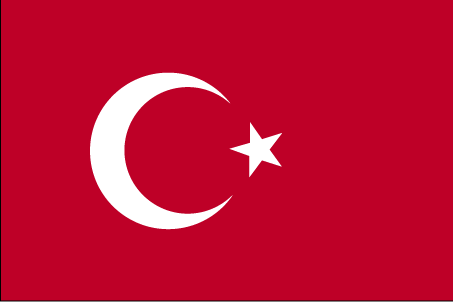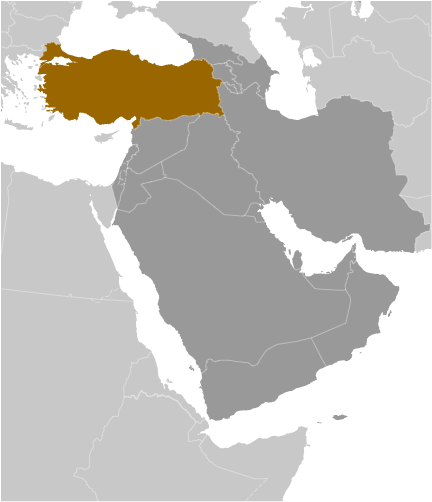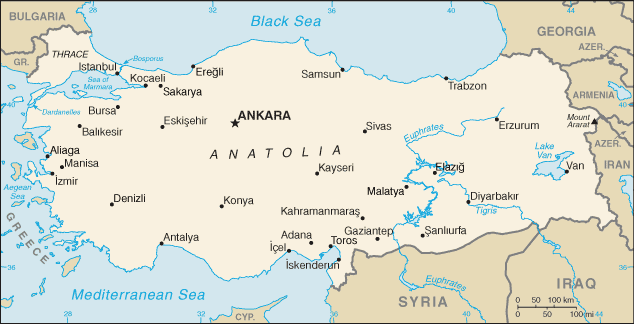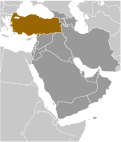
|
|
Advertisements:
People And SocietyNationality
Noun Turk(s)
Adjective Turkish Ethnic groups
Turkish 70-75%, Kurdish 18%, other minorities 7-12% (2008 est.) Languages
Turkish (official), Kurdish, other minority languages Religions
Muslim 99.8% (mostly Sunni), other 0.2% (mostly Christians and Jews) Population World Ranking: 17
79,749,461 (July 2012 est.)
Age structure
0-14 years
26.6% (male 10,707,793/female 10,226,999) 15-64 years 67.1% (male 26,741,332/female 26,162,757) 65 years and over 6.3% (male 2,259,422/female 2,687,245) (2011 est.) Median age
Total 28.8 years
Male 28.5 years Female 29.2 years (2012 est.) Population growth rate World Ranking: 98
1.197% (2012 est.)
Birth rate World Ranking: 107
17.58 births/1,000 population (2012 est.) Death rate World Ranking: 160
6.1 deaths/1,000 population (July 2012 est.) Net migration rate World Ranking: 63
0.5 migrant(s)/1,000 population (2012 est.) Urbanization
Urban population 70% of total population (2010)
Rate of urbanization 1.7% annual rate of change (2010-15 est.) Major cities - population
Istanbul 10.378 million; ANKARA (capital) 3.846 million; Izmir 2.679 million; Bursa 1.559 million; Adana 1.339 million (2009) Sex ratio
At birth 1.05 male(s)/female
Under 15 years 1.05 male(s)/female 15-64 years 1.02 male(s)/female 65 years and over 0.84 male(s)/female Total population 1.02 male(s)/female (2011 est.) Maternal mortality rate World Ranking: 140
20 deaths/100,000 live births (2010) Infant mortality rate World Ranking: 84
Total 23.07 deaths/1,000 live births
Male 24.13 deaths/1,000 live births Female 21.96 deaths/1,000 live births (2012 est.) Life expectancy at birth World Ranking: 125
Total population 72.77 years
Male 70.86 years Female 74.78 years (2012 est.) Total fertility rate World Ranking: 108
2.13 children born/woman (2012 est.) Health expenditures World Ranking: 88
6.7% of GDP (2009)
Physicians density
1.451 physicians/1,000 population (2008) Hospital bed density
2.41 beds/1,000 population (2008) Hiv/aids - adult prevalence rate World Ranking: 159
Less than 0.1%; note - no country specific models provided (2009 est.) Hiv/aids - people living with hiv/aids World Ranking: 120
4,600 (2009 est.)
Hiv/aids - deaths World Ranking: 102
Fewer than 200 (2009 est.)
Obesity - adult prevalence rate World Ranking: 30
16.1% (2007)
Children under the age of 5 years underweight World Ranking: 98
3.5% (2004)
Education expenditures World Ranking: 134
2.9% of GDP (2006)
Literacy
Definition
Age 15 and over can read and write Total population 87.4%Male 95.3% Female 79.6% (2004 est.) School life expectancy (primary to tertiary education)
Total 12 years
Male 12 years Female 11 years (2008) Unemployment, youth ages 15-24 World Ranking: 28
Total 25.3%
Male 25.4% Female 25.1% (2009)
Comments
Add a new comment: |
Advertisement
Members area
Turkey (Ankara):
 
GPS points from Turkey (Ankara)
|
||||||||

 Modern Turkey was founded in 1923 from the Anatolian remnants of the defeated Ottoman Empire by national hero Mustafa KEMAL, who was later honored with the title Ataturk or "Father of the Turks." Under his authoritarian leadership, the country adopted wide-ranging social, legal, and political reforms. After a period of one-party rule, an experiment with multi-party politics led to the 1950 election victory of the opposition Democratic Party and the peaceful transfer of power. Since then, Turkish political parties have multiplied, but democracy has been fractured by periods of instability and intermittent military coups (1960, 1971, 1980), which in each case eventually resulted in a return of political power to civilians. In 1997, the military again helped engineer the ouster - popularly dubbed a "post-modern coup" - of the then Islamic-oriented government. Turkey intervened militarily on Cyprus in 1974 to prevent a Greek takeover of the island and has since acted as patron state to the "Turkish Republic of Northern Cyprus," which only Turkey recognizes. A separatist insurgency begun in 1984 by the Kurdistan Workers' Party (PKK) - now known as the Kurdistan People's Congress or Kongra-Gel (KGK) - has dominated the Turkish military's attention and claimed more than 30,000 lives. After the capture of the group's leader in 1999, the insurgents largely withdrew from Turkey mainly to northern Iraq. In 2004, KGK announced an end to its ceasefire and attacks attributed to the KGK increased. Turkey joined the UN in 1945 and in 1952 it became a member of NATO. In 1964, Turkey became an associate member of the European Community. Over the past decade, it has undertaken many reforms to strengthen its democracy and economy; it began accession membership talks with the European Union in 2005.
Modern Turkey was founded in 1923 from the Anatolian remnants of the defeated Ottoman Empire by national hero Mustafa KEMAL, who was later honored with the title Ataturk or "Father of the Turks." Under his authoritarian leadership, the country adopted wide-ranging social, legal, and political reforms. After a period of one-party rule, an experiment with multi-party politics led to the 1950 election victory of the opposition Democratic Party and the peaceful transfer of power. Since then, Turkish political parties have multiplied, but democracy has been fractured by periods of instability and intermittent military coups (1960, 1971, 1980), which in each case eventually resulted in a return of political power to civilians. In 1997, the military again helped engineer the ouster - popularly dubbed a "post-modern coup" - of the then Islamic-oriented government. Turkey intervened militarily on Cyprus in 1974 to prevent a Greek takeover of the island and has since acted as patron state to the "Turkish Republic of Northern Cyprus," which only Turkey recognizes. A separatist insurgency begun in 1984 by the Kurdistan Workers' Party (PKK) - now known as the Kurdistan People's Congress or Kongra-Gel (KGK) - has dominated the Turkish military's attention and claimed more than 30,000 lives. After the capture of the group's leader in 1999, the insurgents largely withdrew from Turkey mainly to northern Iraq. In 2004, KGK announced an end to its ceasefire and attacks attributed to the KGK increased. Turkey joined the UN in 1945 and in 1952 it became a member of NATO. In 1964, Turkey became an associate member of the European Community. Over the past decade, it has undertaken many reforms to strengthen its democracy and economy; it began accession membership talks with the European Union in 2005.